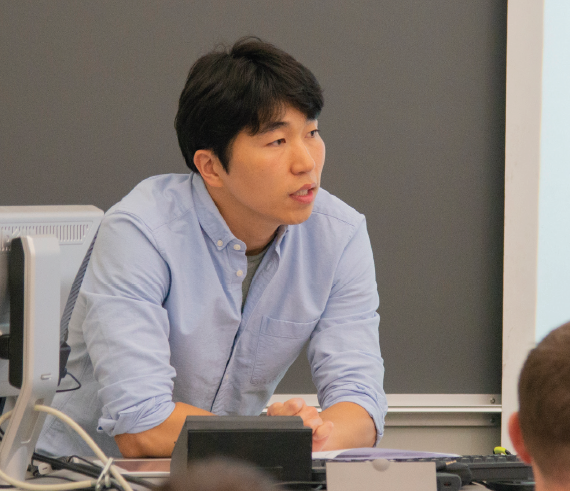Q&A with Daehwan Kim, Ph.D.

Our new assistant professor of biology and the Hodson/Maryland Endowed Chair in Advanced Bioproducts Research and Education brings expertise from one of the largest food and biotechnology companies in Asia.
Faculty Q&A | Hood Magazine, Spring 2019
What are you teaching right now?
I am currently teaching the Biology of Food and Nutrition lab and pursuing biofuels/bioenergy research as an assistant professor of biology. I’ve been here since fall 2018.
What type of biotechnology work did you do in Asia?
Before coming to the United States in 2013 for my graduate study, I joined a company called NongShim R&D Center as a researcher. It is one of the largest food and biotechnology companies in Asia, where I was involved in the development, testing and patenting of more than 10 varieties of processed food products. It was my role to find new approaches, apply for patents, publish papers, develop commercial products and solve problems. My work has dealt with biochemical conversion, ethanol production and microbial/enzyme treatments. One interesting research project I conducted pertained to the enzymatic reactions of fatty acid. I discovered a substitute for capsaicin, an active component of chili peppers and an essential ingredient of noodle products. Synthesized capsiate has a 1,000-times milder taste than original capsaicin, which can be used to control the intensity of the spice’s flavorings. Capsiate also has pharmaceutical applications, since capsaicin is currently used as a painkiller for the temporary relief of minor aches and pains of muscles and joints associated with arthritis. With this finding from our work, we published one patent: “Method of manufacturing of capsiate analogues” (Kim et al., 2012).
What brought you to the United States and to Hood?
At my university, there was a vibrant student life. I have experience as an Uzbekistan overseas volunteer from COPION (Cooperation and Participation In Overseas NGOs), where I worked as a teacher at the school for the physically handicapped. I enjoyed being able to help kindergarteners learn during their experience in a classroom. Staying surrounded by various young kids who have individual disabilities and different cultures, I was encouraged to consider the human experience. Most of the kids in the class wanted to be doctors or scientists because they would like to provide specialty care to others, especially parents and friends who have similar symptoms. As a student, exposure to diverse peoples was instrumental in shaping my worldview and values. Before I was fully aware of it, I was deeply touched by their pure minds, and I began dreaming of being a scientist who can help others through my area of interest. This is just one of my experiences that keeps me motivated to find new knowledge and contributes to my passion for academic and/or industrial fields. I believe that these experiences and pursuits brought me to the United States for my Ph.D. study, and gave me an opportunity to teach and conduct my research at Hood College.
In your endowed position, what are your goals?
My prior research and industry background primed me to investigate the enzymes and microbiology underlying in the applications of microorganisms used in the food industry and the production of ethanol and value-added molecules. I aim to embrace my collaborative and versatile background to generate new research agendas in fermentation science and bioprocess engineering. After joining Hood College, I was fortunate enough to submit a research grant proposal with Hood colleagues, other universities and local companies located in Maryland. The overall goal of this project is to develop the framework for the sustainable production of bioethanol and bioproducts based on energy beets in the Delmarva region. As the Hodson/Maryland Endowed Chair in Advanced Bioproducts Research and Education, my goals are to fill the knowledge gaps, develop economically sustainable processes and components for the commercial system, and to extend the educational and outreach program activities for the biology department and Hood College.
What are you researching or most interested in currently?
My primary research currently is the conversion of coffee wastes (mainly mucilage) into value-added molecules via microbial fermentation. There is no doubt that coffee is one of the most largely consumed beverages along with water and tea worldwide. It is known that coffee is ranked number two as a traded commodity (only after crude oils), with a worldwide production of coffee estimated to be 152 million 60 kilogram bags per year. However, only coffee beans are used for brewed coffee, and other components are separated and removed. These components constitute more than 50 percent of an initial coffee fruit weight that would be approximately 15 million tons per year. Considering the current facts and issues, our research team, including Hood College, Purdue University and the National University of Colombia, are devoted to reusing the coffee wastes as a renewable resource for beneficial molecules such as ethanol, hydrogen and other bio-chemicals. We have successfully completed some of our preliminary works, which were published in scientific journals. I believe that the current research with coffee wastes will give a promising alternative for agricultural waste feedstock, and provide new applications for valuable molecules. We are still working on it!
Are you ready to say Hello?
Choose a Pathway
Information will vary based on program level. Select a path to find the information you're looking for!
